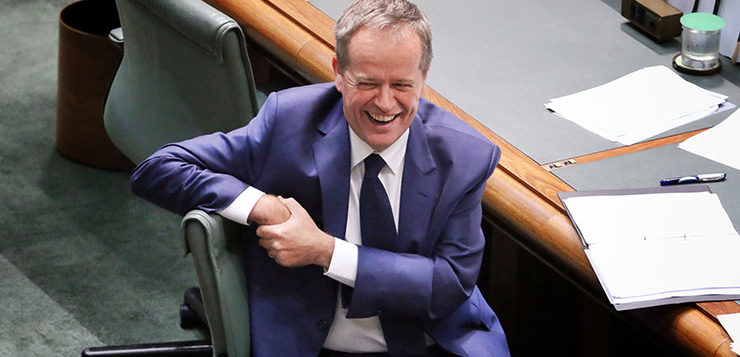Please don’t stuff this up Bill, writes Liam McLoughlin.
Dear Bill,
I am writing to you today to respectfully and kindly request that you stop dicking around and start presenting a truly progressive vision for Australia.
It has come to my attention in recent times, say for the last 20 years, that your party has been offering itself as the gluten-free alternative to the Liberals: less toxic but more insipid.
It turns out that people don’t really like gluten-free bread but will eat it if they think it’s their only option.
And despite losing in 1998, 2001, 2004, 2013 and 2016 with this approach, while winning in 2007 with what at least seemed like something different, you persist with the political equivalent of a white rice, mashed potato, gluten-free white bread sandwich.
And yes, the Liberal Party has made us all sick, but the road to long term health is not paved with colourless starch.
Your upcoming election strategy appears to be photocopying Liberal policies on encryption, climate, refugees, the Trans-Pacific Partnership, political donations, corporate lobbying, and arms exports while offsetting them with an electrifying vision for dividend imputation, negative gearing, and capital gains.
But it’s pretty clear that your real election strategy, which is about as smart as the “real Julia” strategy, is “we’re not the Liberals”.
So it seems strange that you keep copying their policies.
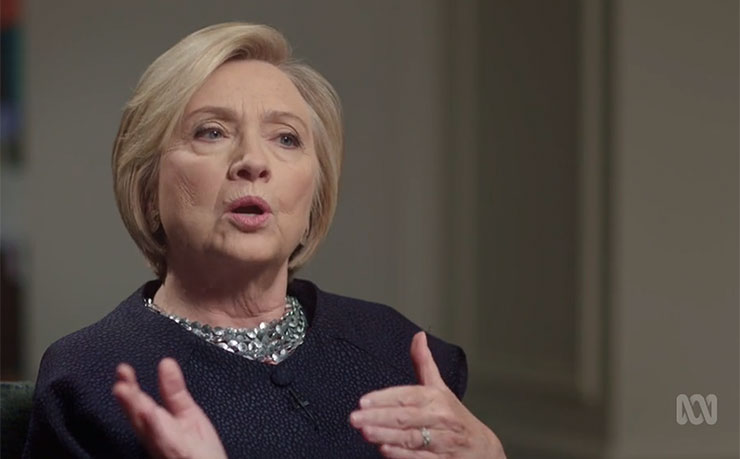
Perhaps it’s worth looking into ancient history to see how Hillary Clinton’s “I’m not Donald Trump” campaign worked out. And at least she had the advantage that she looked nothing like Donald Trump.
Or you could cast your mind back to May 2015 in the UK when Ed Miliband’s Labour Party took its cues from the right on immigration and “fiscal responsibility” (sound familiar?) and suffered its worst defeat since 1983. Meanwhile, the Scottish National Party presented a message of wealth redistribution and increased their vote from six seats in 2010 to 56 out of a possible 59 in 2015. The UK Greens offered a complete rejection of austerity and even challenged the mantra of economic growth itself and won over a million votes, five times more than the previous election in 2010.
Shortly after that election the Institute for Public Policy Research released a study showing “people were more likely to vote Labour in 2015 when they thought the party was more left-wing and less likely to vote Labour when they thought it was centrist”.
If you think your current 10-point lead in the polls is unassailable, remember this.
In 1998, the Howard Government trailed all year in the polls, down 44-56 only 11 weeks before the election.
In 2001, pollster Gary Morgan said the Coalition Government had “zero chance” at the election, Howard himself recognised the “widespread perception among political commentators… that a change of government is well nigh inevitable”, and by April of the election year the Government was 20 points behind according to an Age poll.
In 2004, savvy political commentator George Megalogenis said the Howard Government was “facing a landslide defeat” and within five months of election day was behind 44-56.
I guess it’s lucky for you that history never repeats itself.
If you need more evidence than your own history and recent US and UK elections that starch-based centrism is bankrupt, not just morally and politically but also strategically, cast your eyes to Europe.
According to The Independent, the popularity of centre-left parties in The Netherlands, Greece, Italy, Germany, and France has sunk to historic lows. There are few clearer indicators of this than the nosedive in approval ratings of French President Emmanuel Macron and the concomitant rise of the Yellow Vest movement.
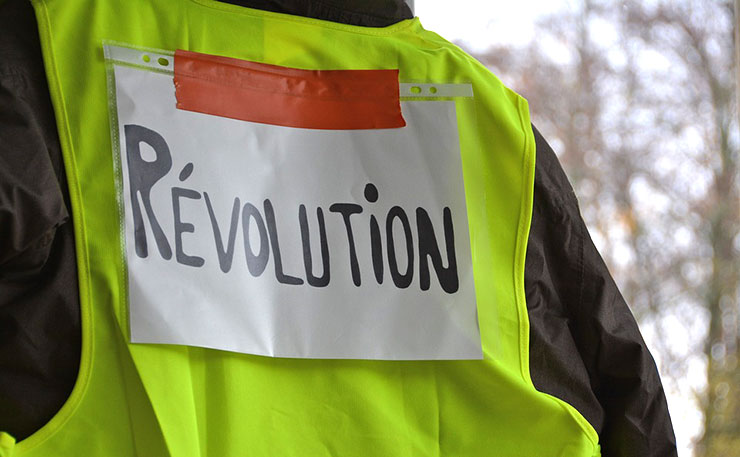
So if a vanilla neoliberal sponge cake topped with some beige “we hear your concerns” icing is not the answer, then what’s a centre-left party struggling to kick its status quo habits to do?
Why offer up the progressive summer salad of our dreams of course!
And where could you look for culinary and political inspiration?
Not known for its gastronomical delights, Britain has recently become a buffet of left-wing phytonutrients. In early May 2017 a YouGov poll showed 50 marginal Labour-held seats would fall to the Tories in the June election. On May 16, leader Jeremy Corbyn launched Labour’s manifesto called For The Many, Not The Few, a genuinely progressive platform which included policies to scrap student tuition fees, introduce higher taxes for the wealthy, nationalise England’s water companies, and expand free childcare. By June 1st another YouGov poll predicted a hung parliament and Jeremy Corbyn’s personal approval ratings shifted from 37 points behind Theresa May a month earlier to 3 points in front.
That year chants of “Oh, Jeremy Corbyn!” echoed around the nation and his agenda has led to an increase in Labour Party membership from about 200,000 before he became leader in mid-2015 to 540,000 as of April this year.
At British Labour’s 2018 conference a range of left policies made headlines including providing worker positions on company boards, implementing maximum pay ratios, eliminating unpaid internships, ensuring 60% renewable energy by 2030, banning fracking, making 4,000 homes available to end homelessness, and adhering to Britain’s moral obligations to refugees under international law.
At your conference the main headlines have been about your heartfelt desire for protesters and the Labor Left to shut up already about humane refugee policy and the Adani coalmine.
And you wonder why membership of your party hovers around 10,000.
While you dither about with an 18-month review of Newstart allowance, over in Spain, Prime Minister Pedro Sanchez announced a 22% increase in the minimum wage in 2019, the largest increase in 40 years.
The Socialist Party in Portugal has recently won historic election victories based on their left-wing platform. Governing with the support from the Left Bloc, the Greens and the Portuguese Communist Party, they enjoy a 15-point lead in the polls over their centre-right rivals. Prime Minister Antonio Costa leads his opponent Rui Rio by 23 points. Who would have envisioned the popularity of policies which actually benefit the majority of the electorate, such as increasing state pensions, the minimum wage, public sector pay, and welfare benefits at the same time as cutting taxes for the least well off.
In May 2015 in Alberta, Canada, the Greens equivalent New Democratic Party (NDP) ended 44 years of conservative rule with a platform of raising the corporate tax rate and lifting income taxes on the top 10 percent, increasing their seat total from 4 in 2012 to 53 in 2015.
Sadly, later that year the federal NDP failed to learn the lesson that if you embrace the neoliberal agenda you will be punished, but if you reject it, you will be rewarded.
Much like the tactics of British Labour earlier that year, the NDP leader Tom Mulcair positioned himself as a defender of big business (Mulcair’s nickname is “Albo”) and failed to campaign effectively on the theme of inequality. As a result, the party’s vote dropped 10 percent during the course of the campaign and their seat share dropped from 103 in 2011 to 44 in 2015.
According to the NDP post-mortem, they made the mistake of running a centrist campaign (such as promising to retain conservative tax cuts to the rich) which “was out of sync with Canada’s desire for a dramatic break” from the conservatives.
At the same time, Justin Trudeau of the centre-left Liberal Party outflanked the NDP, promising to run deficits to pay for infrastructure spending and calling for higher taxes on the rich. Their seat share increased from 77 in 2011 to 184 in 2015.
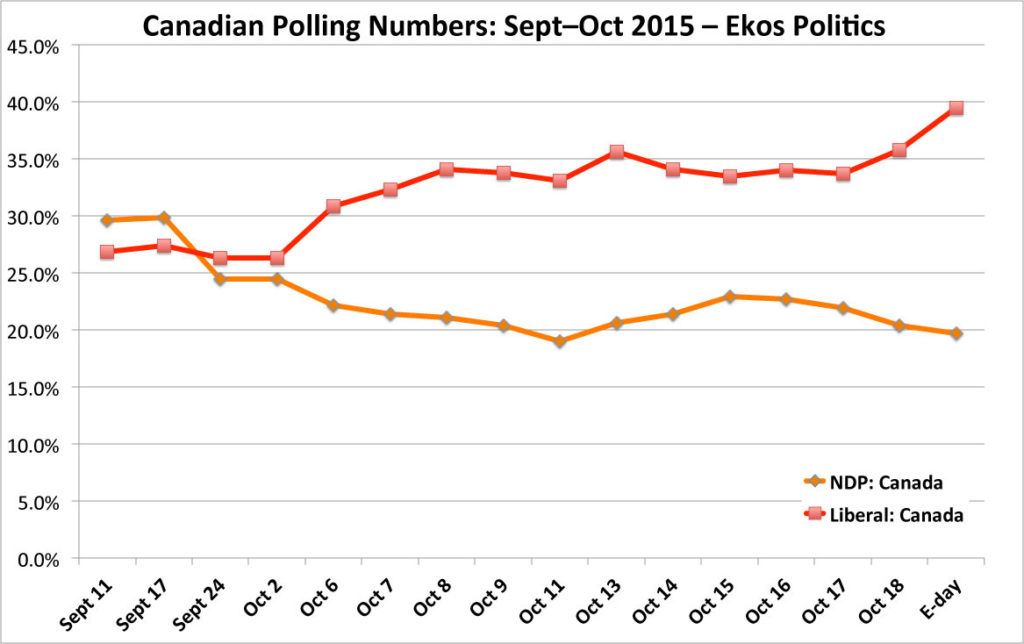
This election was summed up by Canadian climate activist Naomi Klein when she said, “The Libs ran left and soared. The NDP moved right and crashed”.
There you have it in a nutshell. Move left and soar. Move right and crash.
We’ve seen the same phenomenon in the United States. In the 2016 primaries, democratic socialist Bernie Sanders was thought to have less chance than Marx’s exhumed corpse of getting anywhere near Hillary Clinton’s delegate count. Despite evidence of rigging and the extremely undemocratic role of the superdelegates, and thanks to tireless messaging on inequality and a broad progressive platform, Sanders came close to securing the nomination. He has become the most popular politician in the United States and is poised for a successful run at the Presidency in 2020.
Earlier this year, 29-year-old Bronx activist Alexandria Ocasio-Cortez was given similarly dismal chances in a New York district Democratic primary against 10-term incumbent Democratic congressman Joe Crowley, tipped to be a future Speaker of the House. Ocasio-Cortez ran on a platform of tuition free college, universal healthcare, and criminal justice reform, and refused corporate donations for her campaign.
Outspent 10:1 by the Crowley campaign, she gained 57.5% of the vote. She has now become the youngest woman ever elected to congress and is getting significant traction in her campaign for a Select Committee for a Green New Deal. Such a programme would make the U.S. economy carbon neutral while promoting “economic and environmental justice and equality”.
So Bill, how much more evidence of the success of an authentically progressive agenda do you need before you’ll do away with your shilly-shallying?
For Christ’s sake, and for the sake of all Australians who’d quite like a liveable future, please stop feeding us your slightly-watered-down-guilt-filled neoliberal starch sandwich. Please start feeding our fat, depressed, diabetes-riddled bodies some healthful colour with a generous helping of left-wing ambition.
Now to be fair, there’s evidence from your 2018 conference that you are tentatively flirting with a more progressive campaign. “A Fair Go For All Australians” is slightly less tranquilising than previous outings of “A New Way for Australia’s Future”, “Let’s Move Australia Forward” and “A Secure Future For All Australians”, though it’s no “For The Many, Not The Few”. Although if you’re not even willing to commit to a Newstart increase I’m not sure how we’re supposed to believe you care that much about the fair go.
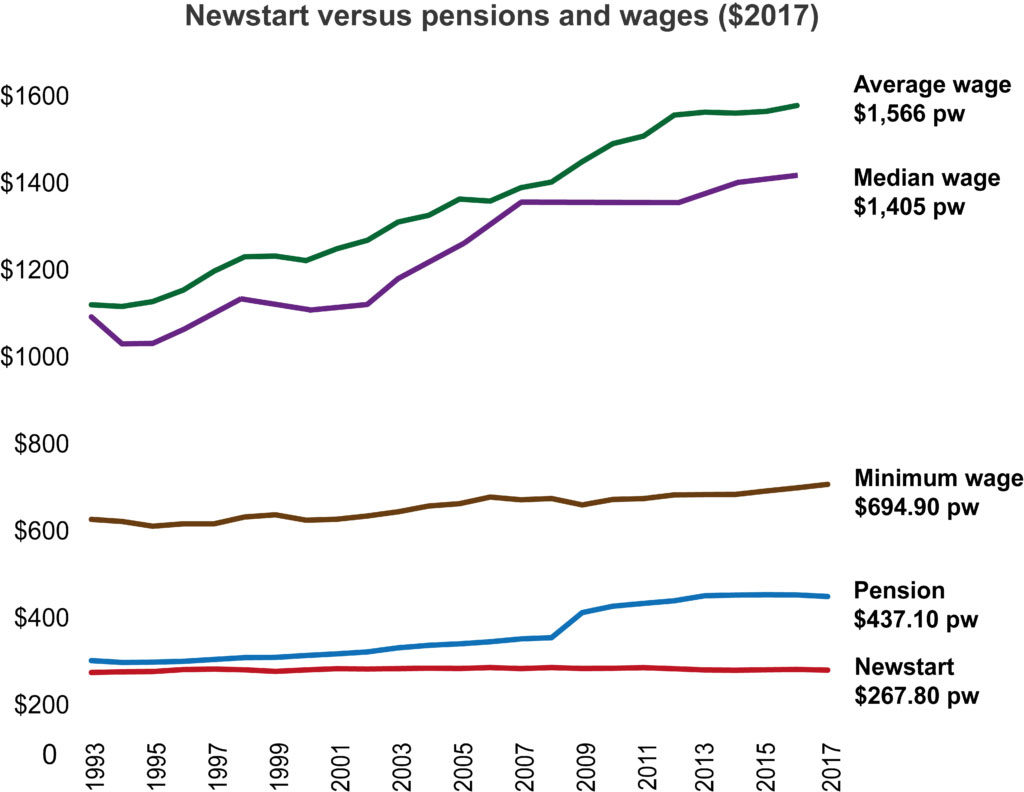
Your pledges on affordable housing, new environmental regulations, humanitarian intake, and workplace relations are steps in the right direction, but in view of the evidence about the success of a progressive populist agenda and basic human decency, your stances on Newstart, refugees and Adani are inexcusable.
Given your party has squandered huge election-winning margins three times since 1996 with a small target strategy, why not go bold in 2019?
Why not make the 2019 election a referendum on inequality, worker’s rights, climate justice, humane treatment of refugees, and a Treaty for Aboriginal Australians? Public opinion would be behind you and you’d romp it home.
Why not ditch the Liberal impression act, now that they are less popular than faeces-flavoured ice cream?
Why not lead a party worth voting for?
Yours in hope,
Liam McLoughlin
Donate To New Matilda
New Matilda is a small, independent media outlet. We survive through reader contributions, and never losing a lawsuit. If you got something from this article, giving something back helps us to continue speaking truth to power. Every little bit counts.

